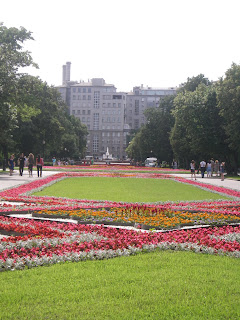I hate traveling. It's stressful, scary, and tiring. You have to worry about schedules for transportation or attractions; scams against tourists/foreigners; staying within your budget; and keeping busy. It's hard! When I first came to Russia, I wanted to settle in and feel comfortable with the country before traveling. Winter came soon after and I wanted to be indoors as much as possible. I didn't go home like I was supposed to because I wanted to see Russia when it got warmer. Well, it's over 80 degrees F now, so I it was logical--I had to (read with a breathy, enthusiastic tone) start traversing the vast and exotic lands of Russia. I don't like traveling compared to relocating, but I will take what I can get and I'll go just about anywhere.
Last Wednesday, I was a snob. I was not very enthusiastic about visiting Moscow or St. Petersburg because many people (Russians and foreigners alike) told me that it's "just another big city" and that it "isn't real Russia." After only spending a few days in Moscow, I couldn't disagree more.
A fire show in Bolotnaya Square.
On my first day here, Andrey (my host) told me that we were going for a walk in a park where strange people gather. That didn't scare me for some reason. He was not exaggerating. With all due respect, walking through this park (Bolotnaya Ploshad) was like walking through a zoo/carnival sideshow and literally watching all sorts of people from Moscow's subcultures. There were emos, punks, goths, hippies, and bikers hanging out in their respective places but living in harmony. When the sun went down, life got interesting and there was fire. People from different subcultures were dancing, breathing, and playing with fire. We sat there in a hypnotic trance for a couple of hours just watching the glow.
On a walk in Tsaritsino Park, I found that even the gates were decorated with locks. This was also a popular spot for wedding parties.
Russians are romantic and sweet. Not so far from Bolotnaya Square is a foot bridge with metal trees where newlyweds place locks with their names and wedding date. The symbolism is a bit strong, isn't it? You can choose whether or not it is a positive or negative metaphor.
The fountain in the middle of Tsaritsino Park is the grandest fountain I've ever seen. It only matches with the grand feeling you get when you walk through the park. It's a little cheesy because the background music is a mix of pop, but the water display is great. This wasn't even the main attraction in this park.
Finding Tsaritsino park was accidental and perhaps one of the luckiest things that happened to me in Russia. It's a huge park that was meant for royalty as a vacation spot, but Catherine the Great didn't like it too much so she stopped its production. Everything in that park is beautiful.
Moscow's parks are very impressive. They are what every city park should be like. The grass is lush and green. The ambiance is perfect because it's so peaceful--exactly the break any urban dweller needs. Moscow is old and rich with history, but somehow, the new and the old pair well together.
Just like most things in Russia, they go all out with the decorations and colors. The flowers are bright and happy--and they aren't even in full bloom yet. This was taken at Bolotnaya Square.
The Kolomenskoe Estate grounds display exactly what I mean about old and new structures melding well together. From this site, the backdrop is of the city and modern buildings. This particular structure is a piece of the Church of the Ascension, a UNESCO site. Look for it in the future as I plan to commission my palace with designs in this style.
Moscow is a city with historical landmarks, but don't forget that it's still a city.
In a few days, there will be a motocross event outside of Red Square and behind St. Basil's Cathedral.
Seal, Matisyahu, and the Wu-Tang clan will tour through Moscow, too.
Needless to say, Moscow shocked me completely and I am absolutely impressed (because of everything this city has to offer and because I had misjudged the city). It is a huge city and it is Russian without a doubt.
 A camera will never ever ever ever be able to capture how big this country is. Even in a small city (about 315,000 inhabitants), the land was vast.
A camera will never ever ever ever be able to capture how big this country is. Even in a small city (about 315,000 inhabitants), the land was vast. Don't let the name 'Gladiator' fool you because the decorations were inspired by the Middle Ages, nautical life, combat arts, and the disco period.
Don't let the name 'Gladiator' fool you because the decorations were inspired by the Middle Ages, nautical life, combat arts, and the disco period.  In the hotel's restaurant is a two-story dining hall complete with a lit dancing floor, disco ball, stripper pole, piano, and medieval crests.
In the hotel's restaurant is a two-story dining hall complete with a lit dancing floor, disco ball, stripper pole, piano, and medieval crests.






















